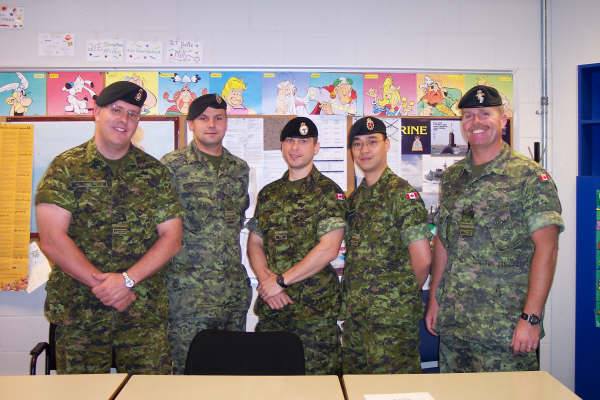Ed. Note: While this piece is written in Andrew’s voice, both authors have contributed equally to the article.
I was lost. After 18 years of service as a military nurse in the Canadian Armed Forces (CAF), diagnosed with post-traumatic stress disorder (PTSD) and chronic back pain, I suddenly found myself in the middle of Toronto, lost.
The constant bombardment of noise pollution and medical helicopters flying overhead triggered flashbacks. It was unbearable to leave my house. I was paralyzed. I was lost.
I tried to find help. In one referral after another, they all told me that the combination of my physical and mental health injuries was too complex. Shut out by five providers, I was lost.
I contacted Veterans Affairs Canada, which referred me to the nearest Operational Stress Injury Clinic in London, Ont., a two-hour trip each way. Since I could barely leave my house, that was an impossible trip to make. I was lost.
I called the crisis helpline. In one call after another, they asked me if I was in immediate danger. I wasn’t initially and they all told me to see a provider in the community, a provider I did not have in Toronto. I was lost.
And in the end, I found myself with a bottle of Scotch and a bottle of morphine, and then a quick trip to the hospital. I was lost.
Let me back up a bit.
I was a General Duty Nursing Officer with the Canadian Armed Forces (CAF), which meant that I was a “jack of all trades.” I joined at the height of the Afghanistan deployment, and I was trained as a medical-surgical and emergency/trauma nurse.
As an officer, I was also employed in numerous leadership roles including Immunization Clinic Team Lead in the National Capital Region, where I provided immunization to all personnel, from the Governor General to the Chief of Defence Staff. I was also employed as the Patient Liaison Nurse where I coordinated casualty repatriation.
The most challenging experience was my role as the Patient Liaison Nurse , in which while coordinating care, I listened to soldiers as they shared their experiences from Afghanistan. Many of the stories were horrific and heartbreaking. Some suffered physical injuries including missing limbs; many suffered from psychological injuries after witnessing the death or injuries of their comrades; many had attempted suicide.
Even with all the training that the military provided – to “improvise, adapt and overcome” any situation that I encountered – and the clinical experience I had in my 18-year career, I found it difficult, if not impossible, to navigate the mental health-care system once I was no longer in uniform.
I was lost.
I experienced a different health-care system while I was in uniform. Though not perfect, it was by far better than the one I experienced once I left the military.
In 2000, the Canadian Forces Health Services underwent a reform known as Prescription 2000 (Rx2000). This reform included the Primary Care Renewal Initiative and the Canadian Forces Health Information System, which led to Primary Care and Mental Health Clinics being placed under one roof. It meant that when I went to see my primary care provider, I also saw my mental health provider in the same building. Both providers used the same electronic medical record and could communicate with each other. I could also walk into any Canadian Forces clinic across the country and expect the same level of care.
Once I was out of the military, I used the same mental health care system as all Canadians, and my experience was fragmented and disorganized. It was difficult to access the right care. When I found the appropriate care, I had to travel a long distance. Providers did not communicate with each other, and I constantly had to retell my story, re-traumatizing me each time.
Because of this chaotic system, I ultimately landed in a hospital. I am fortunate enough to have survived.
But a better system already exists in Canada – I experienced it in the military. I do not want special treatment because I am a veteran, I want all Canadians to be able to access the same mental health system when they need it. That is why I was in uniform, to serve all Canadians.
Mental health is a leading cause of disability in Canada. Family physicians are often not well-prepared to provide mental health services but are the primary sources for mental health care. This leads to fragmented and poorly coordinated care.
The Canadian Forces Health Services Group fills this gap by providing coordinated primary care and mental health services to all Canadian Armed Forces personnel under one umbrella. It provides care that is comparable to provincial health-care plans available to all other Canadians. Additionally, it has a strong public health system that is critical for all CAF members.
It would be useful to examine how the CAF transformed a health-care system that had lost the confidence of its members in the 1990s to one where it says it can “ensure serving members benefit from equal access and standardized health care, anytime, anywhere in Canada and abroad.” Rx2000 grouped several initiatives into four pillars including continuity of care, accountability, health protection and sustainability of human resources. At the end of this reform, all health-care providers are united under a single chain of command, and health care is delivered by a multidisciplinary team. The success of this long-lasting Rx2000 reform was also the result of “the willingness and ability of leaders throughout the organization to communicate clearly and constructively the benefits of the different initiatives being implemented.”
Identifying the successes in Rx2000 and implementing them for all Canadians could forge a better way.
Photo courtesy of Andrew Lo, pictured second from right.



The comments section is closed.